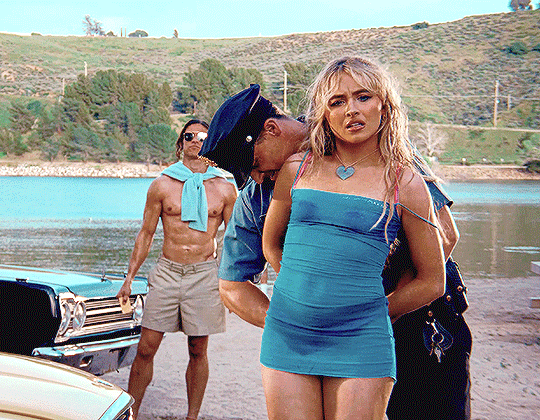The problem with reading old science fiction is we're living in the future. This can happen with technology and other cultural and political stuff too. I think the Soviet Union still exists in Star Trek lol.This is an example of the kind of earlier sci Fi book that breaks my suspension of disbelief because of the way women are depicted. I find it jarring to have these big ideas and advanced tech, but gender roles that are rooted in the 50's or 60's.
I guess generally it's best to just consider it an alternate universe.
I feel like any sci-fi that takes place in the distant future and doesn't include artificial wombs, and people altering their sex characteristics often when it likely becomes easier seems unrealistic to me based on how people use avatars online and choose gendered characters in video games and current development of artificial wombs.
Like we have AI now, very basic artificial wombs, scientists have created egg cells from the skin of male mice and then created baby mice that were genetically related to the two male mice so eventually samesex reproduction will likely be possible in Humans - probably in the next 200 years max, we should be able to use gene therapy to grow a third set of teeth within the next 6 years and so on. (Most of the examples I'm listing are biological and biotech because I pay slightly more attention to that.)
I think samesex people will be able to have kids way before artificial wombs. Perhaps that's not so weird though. IVF is already legal so that will pretty much become legal more easily anywhere where being gay is legal. Artificial wombs freak people out even more.
https://www.npr.org/sections/health-...remature-birth
The Toronto group has seen blood clots and heart problems develop. So far, they've only been able to sustain a pig fetus for about a week.
But researchers at Children's Hospital of Philadelphia have safely sustained fetal sheep on a very similar device for four weeks, making the Toronto group and others optimistic the approach will eventually work.
"If this artificial womb technology could sustain a patient even for a period of weeks and get them to a later stage and a bigger size, that could potentially be quite a dramatic change in our field," says Dr. Mike Seed, an associate professor of pediatrics at the University of Toronto who is working with Haller.Assuming the technology works why the hell would you fear that? People who want to carry babies the traditional way could still do that but if you have another option nobody should be forced to go through all that.What if it becomes possible to use artificial wombs to gestate fetuses for an entire pregnancy, making natural pregnancy unnecessary?
"We've heard people fearing that this translates into women not having to go through a full pregnancy anymore -- kind of more like a Matrix-style of dystopian future," Haller says.
"But it would be outrageous to assume that any artificial intervention in any way is better than nature. So if you're not running into problems in your pregnancy, I think there's a lot of evidence that you're better off being born as you should be from what nature intended," he says.
I think I remember someone (it might have even been Grimes actually lol but maybe not, I know she brought up artificial wombs though as she almost died,) saying one day we'd look back at this expectation that women should do this as barbaric and I agree.
No this is what she said which is close enough (someone definitely said that though):
I just found this webpage (I remember seeing some of this twitter discussion at the time):Having had a child, I can assure u the value proposition of artificial wombs is perhaps one of the most profound I can imagine for our species. We've mostly eliminated active warfare from men's lives, the violence of childbirth 4 women should be an option not a necessity
https://www.noahpinion.blog/p/i-can-...that-its-going
"Why take on the risk?"
Really? Many people with wombs agree. Why take the risk? Of course people then shame people for not giving birth.
Yeah unsurprisingly (given the social circle,) a lot of the people involved in that discussion were out of touch lol like in the twitter screenshot above. The main pro would be reducing the physical labour of pregnancy and childbirth. Economically speaking though it won't make a huge difference. In heterosexual relationships women generally take on more childcare duties with kids while men (assuming they're present at all) are less involved.Predictably, this produced the usual torrent of knee-jerk petulant anger toward technologists, but it also produced a fair amount of interesting commentary and thought surrounding the idea of artificial wombs. As Hollis Robbins pointed out, it's pretty unlikely that artificial womb technology would substantially reduce the cost of raising a child, since almost all of this work happens after the child is born. And thus it'll be unlikely to significantly increase fertility rates. If you really want to imagine a technology that would make people more eager to have kids, imagine robot nannies.
But as Grimes noted, artificial wombs would significantly reduce the physical strain that pregnancy places on women's bodies
I don't really expect that wage gap to change unless people start paying women for raising kids since most women have a greater prefence to be around their kids more. There are a bunch of guys who are ambivalent about having kids in the first place despite having them, some get pressured into having them by their partners which isn't good.
Yeah the knee jerk naturalist anti tech responses disgust me when you consider what people are expected to go through and the current inequality with surrogacy.We don't talk much about this "violence"; it's one of our last remaining taboos. Instead, we relegate the gory details to the realm of parenting classes and raunchy comedy. But it's absolutely real. We've eliminated many of our burdens through the magic of technology -- carrying water all day, washing laundry by hand in the river, chopping firewood to heat our homes -- but pregnancy remains.
Unless you're rich, of course. My wealthy friend, whose first pregnancy required a hysterectomy due to placenta accreta, will have her second child via a surrogate, using pre-frozen embryos. This costs upwards of $100,000, which is approximately equal to the entire median wealth of an American household.
Who would begrudge my friend this? And even if she were able to bear a second child herself, who would begrudge her the opportunity to outsource it? Artificial wombs are simply a way to take a privilege for the upper class, and make it possible for other classes of society to enjoy it as well.
And this is how it'll almost certainly be received. Angry Twitter people always seem to envision new technologies as something that government imposes on the populace, possibly at the behest of mad billionaires. In the real world, what usually happens is that people simply adopt a new technology because they realize it makes life easier for them. Roon has a good thread about how this is likely to proceed:
I imagine the cost varies considerably as there are some countries like the UK where it's illegal to pay surrogates beyond like general expenses related to the pregnancy so they have to volunteer. It's considered more ethical since they can't be argued to be doing it out of desperation, and to avoid trafficking I guess, but it seems better that people would get paid for that like other high risk jobs. Even then though you still have to pay to freeze eggs since the NHS only covers it for people undergoing cancer therapy or who medically transistion if trans I think (which I have to say is an incentive to do that.)
I hope so but I think the US might be doomed in that sense because there's no precedent. They don't listen to left wing Americans about universal healthcare in general after all and I said even in the UK egg freezing isn't covered except in very limited cases.Maybe in China the government will try to force womb tanks on people to try to raise the birth rate; in America, it'll start out as a luxury purchased by the rich and the infertile, and then in a few years we'll have online socialists angrily demanding that the tech be provided free of charge to all via a program of universal health care. Eventually we'll wonder how we ever did things any other way.
In fact, I've been hoping for womb tanks for a very long time, because of science fiction. One of my favorite sci-fi authors, Lois McMaster Bujold, includes "uterine replicators" as a prominent feature of her futuristic "Vorkosigan" universe (which you should definitely read if you haven't already). The tech is initially reviled as unnatural by the conservative inhabitants of the somewhat backwards planet Barrayar, but eventually it turns out that everyone loves it and it just makes life a lot easier. Like Grimes, Bujold envisions womb tanks helping push the world toward greater gender equality.Artificial womb technology is bound to face plenty of pushback on the somewhat backwards planet Earth, just as it does in the fictional Barrayar. Because, well, it's artificial. The idea of abruptly mechanizing such a basic and fundamental part of human life as pregnancy causes some people to recoil in future-shock. Even when it becomes relatively commonplace, some will probably continue to argue that it's unnatural, some on religious grounds. In fact, as innovation shifts from gadgets and code to biotech and wetware in general, I expect such pushbacks to increase.
But in order to embrace biotech innovation, we need to understand that it's not really any weirder or more unnatural than the kinds of innovation we've been almost continually embracing for a century and a half now. Technology isn't becoming weird; technology has always been weird. In fact, in a very deep sense, that's what technology does --- by increasing human capabilities, it changes the fundamental shape of human life.Unfortunately people do still get chicken pox often in many countries including the UK because we don't vaccinate against it except for people who have weakened immune systems or who are in contact with someone who is high risk for getting seriously ill from it. I think they might be planning to change that soon or maybe already have but the NHS website still says that. So I was born in 1991 and still got chicken pox as a kid.Technology doesn't just increase human capabilities. Technology weirds the world.
Just to drive this point home, I thought I'd make a list of some human experiences that were very basic and normal -- almost universal -- in 1980, but which are now so rare as to be almost unimaginable for much of the population. [...]
9. Getting chicken pox. This was a rite of passage for every kid. You got chicken pox, you itched like crazy for a week, and then you were done with it. It was so inevitable, and so safe, that some people would even intentionally infect their kids with it, just to get it over with. Now, thanks to the varicella vaccine that was introduced in 1995, almost no one gets chicken pox.
Essentially the decision over this was because it was considered not cost effective and because it was believed that exposure to children with the virus would prevent older adults from getting shingles which is usually worse (since the virus basically stays dormant and can be reactivated in later life.) You could still get the vaccines privately for like 150 pounds, but most people wouldn't think to do that due to a lack of knowledge about potential rare side effects that are more severe.
Unfortunately in rare cases the disease is also serious and fatal in children so this decision has led to multiple deaths:
In Easter Sunday 2009, Angie Bunce-Mason noticed that her three-year-old daughter Elana had developed a rash on her body - the tell-tale sign of chickenpox, the common childhood infection which is caused by the varicella-zoster virus.
Her older brother, then six, had contracted chickenpox a week earlier and recovered normally. As an otherwise healthy infant, Bunce-Mason assumed that her daughter would also have few problems. "Like many parents, I just viewed chickenpox as a part of childhood life," she recalls. "I had never heard of anyone experiencing any problems, so I wasn't worried. I even commented to my husband that I was glad she would be getting it out of the way before starting school," she says.
But as the week went on, Elana became worryingly lethargic. On the Friday night, her parents took her to see a doctor who diagnosed her with possible pneumonia. She was rushed to accident and emergency where she went into cardiac arrest a few hours later. By 7am Saturday morning, Elana had died. A pathology report found that the virus had spread to her lungs and wreaked widespread damage, causing lesions which proved ultimately fatal.
"The doctor who performed the post-mortem said that Elana had the worst case of chickenpox that he had ever seen," says Bunce-Mason, who has spent most of the past 15 years attempting to raise awareness among parents and health professionals that chickenpox, a disease encountered by almost all children during their first five years of life, can turn fatal.You might want to stop constantly mentioning money then. No matter the topic I find people always doing this... It's like when there's a serious natural disaster and most of the discussion is about property damage...However, the decision not to vaccinate children against chickenpox is down to more than budget constraints - in many parts of the world, it's a calculated risk that aims to prevent disease in a different group: older adults.
The story of the chickenpox vaccine dates back to the early 1970s when a Japanese virologist called Michiaki Takahashi isolated a strain of herpes virus, which would become known as varicella-zoster, in a three-year-old boy.
This helped yield a vaccine which was initially approved in Japan in 1986, before one became available in the US in 1995. Anne Gershon, professor of paediatrics at Columbia University in New York, recalls how before it was introduced, there would be rare but horrific cases of children who recovered from leukaemia, but later died of chickenpox as their immune systems were too weakened to fight off the infection. "While it's usually a mild illness, it may be severe in immunocompromised children," she says.
Overall, the US Centers for Disease Control and Prevention estimate that during the first 25 years of the chickenpox vaccination programme, the jab prevented an estimated 91 million cases, 238,000 hospitalisations, and 2,000 deaths. While numerous countries have since followed suit, with Australia funding the varicella vaccine under their National Immunisation Programme in 2005 and Israel making varicella vaccination mandatory for children in 2008, there are still many countries that remain reticent to incorporate it as a routine childhood jab. This includes the UK, France, Denmark, Portugal, Norway, and Sweden.So why the reluctance? Some of the concerns have stemmed from the potential consequences of vaccine hesitancy, which was named as one of the top 10 threats to global health by the WHO in 2019. If a large proportion of children are receiving the varicella vaccine, then the virus will no longer circulate to the same extent in the community. This could leave any unvaccinated children more susceptible to contracting the virus for the first time as adults, where the consequences can be more severe, especially in pregnant women as there is a risk of the virus harming the unborn foetus.
But the biggest fear has been lingering concerns that chickenpox vaccination might increase the risk of shingles among unvaccinated individuals in later life. This often painful and debilitating condition is also caused by infection with the varicella-zoster virus. Shingles rates are also expected to rise around the world as the population ages.I think possibly in response to this they've also changed the age where you can get a shingles vaccine to 65 if you turn 65 in 2023. But older adults have to wait till they're 70 still.At first, the connection between chickenpox vaccine and risk of shingles might seem opaque and even counterintuitive. Essentially when we contract chickenpox as children, the virus' DNA lingers deep in our nerve cells, giving it the capability of reactivating many decades later. However, being exposed to small children carrying the virus during our midlife years and even old age is thought to have a protective effect, as it exposes us to small doses of the virus which act as a booster to the immune system and help to prevent the varicella-zoster in our cells from flaring up again.
One of the concerns has long been that if most children received a chickenpox vaccine, this boosting effect would be removed, possibly causing adult immunity to wane faster and leading to more shingles cases. Pollard says this led cautious public health officials to question whether a chickenpox vaccination campaign would really represent value for money.
"If the number of shingles cases started to rise over time, it would be a lot harder for the chickenpox vaccine to be cost-effective," says Ellen Rafferty, a researcher at the University of Alberta in Canada, who has attempted to model the various scenarios in the past. "But while there still remain a lot of unknowns, we have not seen any conclusive evidence of this," she says.
I'm not sure this would help me personally anyway because I'm basically never around young children and I'm not sure how long you'd have to have exposure for it to work. No one I spend significant time with has kids (one has a nephew he hangs out with at christmas but I don't see him often and I don't think exposure can work like that.) I don't leave the house that often and when I do I don't necessarily run into young kids often either. Of course in Japan (they have the vaccination anyway probably since they created it,) there are villages with no or very few kids where this would be especially useless.
For some reason there's a trend to decorate these dying places with stuffed dolls ?? It's quirky and creepy:
So that's one place I was reading about another village thought this might have been the same one but it's not:A village is replacing young people with mannequins as population dwindles: 'Outnumbered by puppets'
The village has a population of 60, with the last baby being born two decades ago
With fewer than 60 people living in the Japanese village of Ichinono, and a majority past retirement age, residents have installed handcrafted stuffed mannequins to recreate the once bustling community.
According to data from the internal affairs ministry, only one baby was born in Ichinono in the last two decades.
The youngest member of the village is two-year-old Kuranosuke, who came to the village in 2021 with his parents, Rie Kato, 33, and Toshiki Kato, 31. The couple chose to move to the rural area from Osaka because of the sense of community, which they found lacking in the city.
I also really hate how people emphasise cost and economic factors whenever discussing anything and health and people dying is basically an after thought...JAPAN: In the village of Nagoro in western Japan, there are no cheerful voices or laughter of children playing on the streets.
The school, the bus-stops and even the streets are eerily quiet. That?s because there are no more children in this community where the last school closed in 2012.
Tsukimi Ayano, 69, is one of only 27 residents remaining. To inject some life back into the village, she created life-sized dolls and scattered them all around the community.
They dot the landscape - along the streets, outside empty storefronts, clustered in the defunct schoolroom, like a scene from a creepy movie set.
"Some (of the dolls) resemble people who used to live here or passed away," said Ayano. Once a thriving village of 300 folks, Nagoro faded after residents died or moved away looking for employment. The youngest villager today is 55 years old.
It's important to know how many people in those countries have been vaccinated against shingles too though. You'd have to assume they'd factor that in but I don't really trust a planet of people who's descisions are made predominantly based on cost. At any rate it will only have a potentially negative effect on people who were born after the vaccine became available so a few generations at most. Except for the people who refuse to vaccinate their kids maybe... It's an incredibly contagious virus so you'd need a pretty high degree of people to be immune I'd guess. A the article mentions people are still dying from chickenpox in small numbers in the US:In the last five years, opinions has begun to shift following large-scale epidemiological studies which have shown that the US and other countries have not actually seen the feared increase in shingles cases over the last three decades. One UK study even estimated that the supposed immunity boosting effect of adults exposed to infected children might be less impactful than previously thought.
Such complications are more common than many realise, particularly in adults who never built up immunity through experiencing chickenpox as a child. One epidemiological survey in France found that severe chickenpox-related complications occurred in 3% of under 15s, and 6% of over 15s. In total, 65 people of all ages died from chickenpox in the UK between 2015 and 2020, while even in the US, where vaccination is common, there are still around 30 deaths from chickenpox every year. The World Health Organization (WHO) has previously estimated that there are approximately 4.2 million cases of severe chickenpox-related complications around the world each year, and 4,200 related deaths.For Bunce-Mason, the news comes with mixed feelings. While she is pleased that the vaccine is finally being recommended in the UK, she feels that the excessive caution surrounding its introduction has resulted in preventable harm. She cannot help but think of how it might have prevented the tragic loss of her daughter, which still impacts her family on a daily basis.
"The impact of Elana's death on our family has been horrendous," says Bunce-Mason. "Her brother Reuben still feels extreme guilt and believes that he is responsible for Elana contracting chickenpox and her death," she says. "As parents, we were robbed of our daughter. Our family life has never been the same. Last year was Reuben's 21st, our 20th wedding anniversary and it would have been Elana's 18th birthday. As parents to young children, we had always said we would have a big family celebration when this time came, but once Elana died there wasn't the joy to celebrate it anymore."




 Reply With Quote
Reply With Quote










